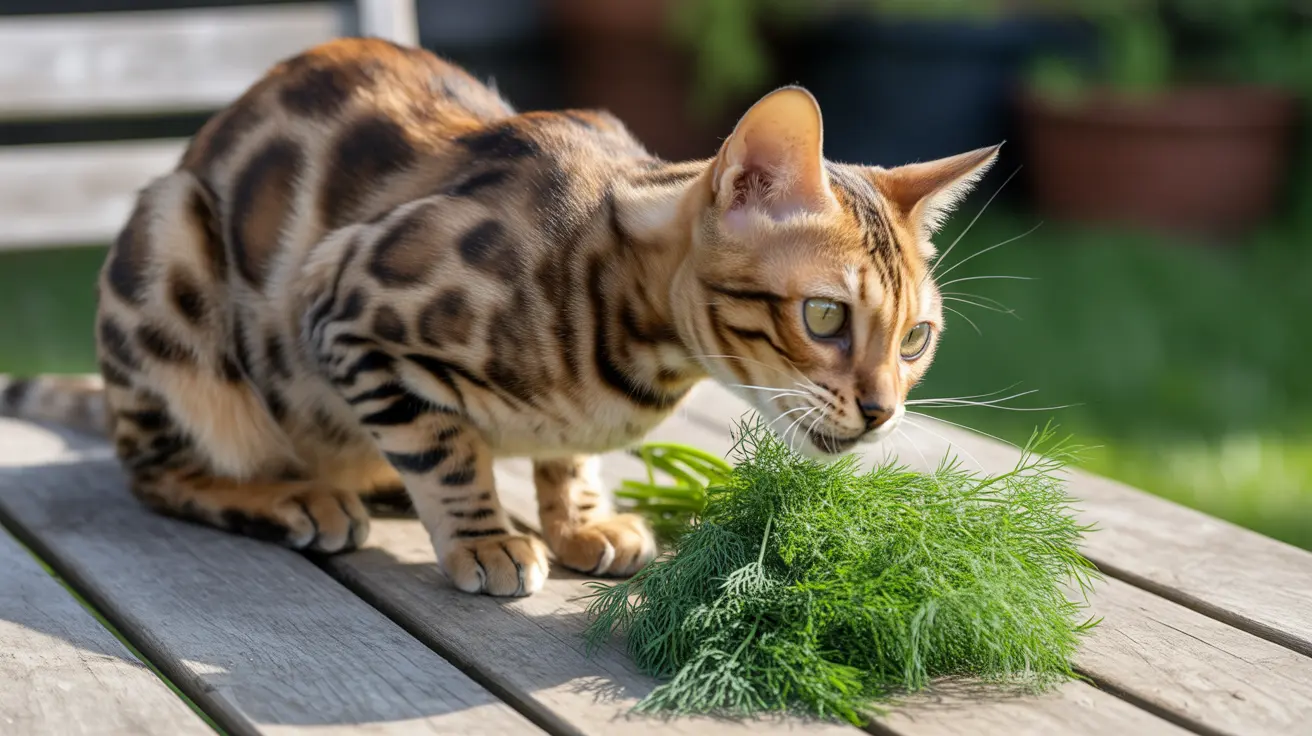If you've ever caught your cat showing interest in your herb garden, you might be wondering: can cats have dill? The good news is that dill is generally safe for cats to consume in small amounts. This aromatic herb, while not nutritionally essential for felines, can be an interesting and safe occasional treat for curious cats.
Let's explore everything you need to know about cats and dill, including safety considerations, proper serving amounts, and potential benefits or risks.
Is Dill Safe for Cats?
Dill (Anethum graveolens) is officially recognized by the ASPCA as non-toxic to cats. The fresh herb poses no significant health risks when consumed in moderation. However, there are some important safety considerations to keep in mind:
- Fresh dill leaves and stems are safe for cats
- The herb should only be offered in small amounts
- Avoid processed dill products with additives
- Never use dill essential oils around cats
Benefits and Limitations of Dill for Cats
While dill is safe for cats, it's important to understand that cats are obligate carnivores. This means they derive little nutritional value from herbs like dill. Any benefits are primarily environmental and enrichment-based:
- Provides sensory stimulation
- Can satisfy natural grazing instincts
- Offers safe exploration opportunities
- Acts as an interesting occasional treat
How to Safely Offer Dill to Your Cat
If your cat shows interest in dill, you can safely introduce it following these guidelines:
Proper Serving Methods
- Offer only fresh, clean dill leaves
- Start with tiny amounts to test tolerance
- Monitor for any adverse reactions
- Remove access to large quantities
Signs of Overconsumption
While dill is non-toxic, too much can cause mild digestive issues. Watch for:
- Vomiting or diarrhea
- Decreased appetite
- Excessive drooling
- Signs of stomach discomfort
Creating a Cat-Safe Herb Garden
If you'd like to grow dill alongside other safe herbs for your cat, consider these companion plants:
- Catnip
- Cat grass
- Parsley (in moderation)
- Basil
- Rosemary
Frequently Asked Questions
Is dill safe for cats to eat, and can it cause any health issues?
Yes, dill is safe for cats to eat in small amounts. While it won't cause toxicity, excessive consumption might lead to mild digestive upset due to cats' sensitive digestive systems.
How much dill can I safely give my cat without causing digestive upset?
A few small leaves occasionally is sufficient. Don't allow unrestricted access to large amounts of dill, and monitor your cat's reaction when first introducing the herb.
Why do some cats like chewing on dill, and is it beneficial for them?
Cats may be attracted to dill's texture and aroma. While not nutritionally beneficial, it can provide environmental enrichment and satisfy natural grazing behaviors.
Can I use dill essential oil around my cat, or is it toxic?
Never use dill essential oil around cats. Concentrated essential oils can be toxic to cats and may cause serious health issues due to their inability to process these compounds effectively.
What other herbs are safe for cats to eat along with dill?
Safe herbs include catnip, cat grass, basil, and rosemary. Always introduce new herbs gradually and monitor your cat's response. Avoid toxic herbs like garlic, onion, and chives.
Conclusion
While dill is safe for cats to consume in moderation, it should never replace their regular diet or be considered a dietary supplement. If your cat shows interest in dill, you can safely allow occasional access to fresh leaves while monitoring their response. Always consult with your veterinarian before introducing any new foods or herbs to your cat's diet, especially if your pet has existing health conditions.






